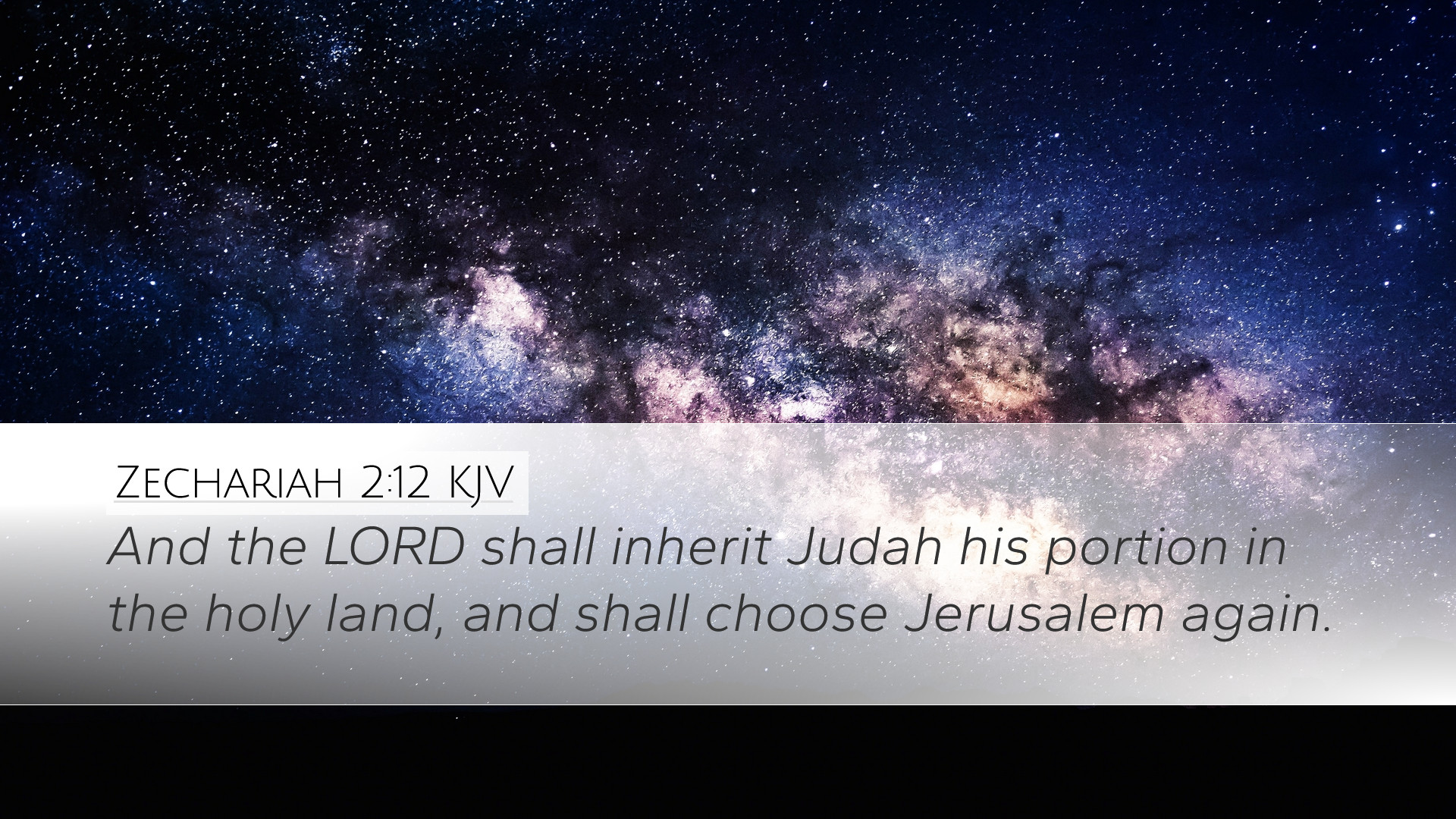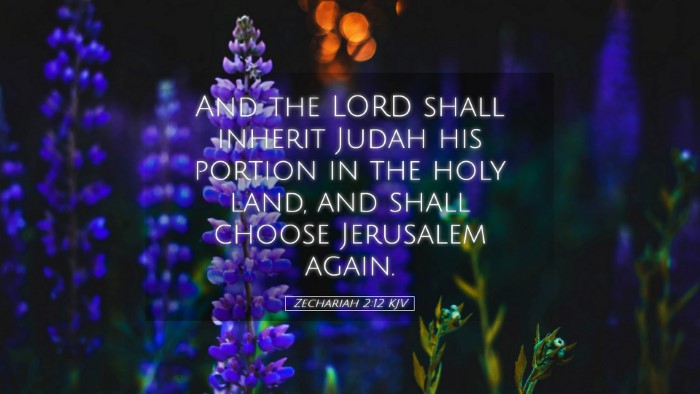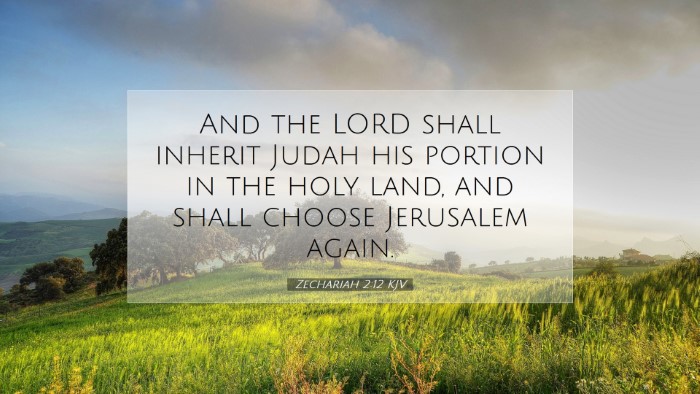Old Testament
Genesis Exodus Leviticus Numbers Deuteronomy Joshua Judges Ruth 1 Samuel 2 Samuel 1 Kings 2 Kings 1 Chronicles 2 Chronicles Ezra Nehemiah Esther Job Psalms Proverbs Ecclesiastes Song of Solomon Isaiah Jeremiah Lamentations Ezekiel Daniel Hosea Joel Amos Obadiah Jonah Micah Nahum Habakkuk Zephaniah Haggai Zechariah MalachiZechariah 2:12
Zechariah 2:12 KJV
And the LORD shall inherit Judah his portion in the holy land, and shall choose Jerusalem again.
Zechariah 2:12 Bible Commentary
Commentary on Zechariah 2:12
Zechariah 2:12 states, "And the Lord shall inherit Judah his portion in the holy land, and shall choose Jerusalem again." This verse encapsulates profound themes of divine ownership, restoration, and the future fulfillment of God's promises to His people. The insights drawn from various public domain commentaries elucidate these themes and provide a deeper understanding for pastors, students, theologians, and Bible scholars within the context of Israel's prophetic destiny.
Divine Ownership and Inheritance
Matthew Henry emphasizes the significance of God's ownership over Judah: "The Lord shall inherit Judah." This speaks to His sovereign claim and disposition towards His people. The term "inherit" indicates that despite Israel's past disobedience and the resultant judgments, God has not abandoned His covenant promises. The language here suggests a future restoration, highlighting God's grace and faithfulness.
Albert Barnes echoes this sentiment, noting that the "portion" signifies not just land but divine favor. He writes, "God's inheritance is not merely physical territory; it embodies the presence and blessing of God among His people." This multifaceted concept of inheritance serves as an assurance of God’s commitment to actively dwell among and bless the people of Judah.
Geographical and Theological Significance of 'Holy Land'
The reference to the "holy land" underlines the sacred nature of the territory in question. Adam Clarke provides historical context, remarking, "The holy land is a symbol of the divine promise and presence, an area that God set apart for His people." This land is intimately connected to Israel's identity and their relationship with God, serving as a constant reminder of His enduring covenant.
Chosen People and Their Restoration
In the latter part of the verse, "and shall choose Jerusalem again," a profound theological affirmation is presented. Matthew Henry comments that this phrase reflects God's deliberate action in restoration: "God's choosing is an act of grace, illustrating His willingness to reaffirm His relationship with a repentant people." This demonstrates that divine choice is not bound by human merit but by God’s sovereign purpose.
Albert Barnes posits that Jerusalem here not only represents the city itself but symbolizes the collective identity of the people. He notes that God's choosing "indicates a new era of spiritual awakening and significance for Jerusalem." The act of choosing Jerusalem again signifies hope for restoration and revival, both physically and spiritually.
Lessons for Modern Believers
From the commentary of Adam Clarke, we glean valuable applications for today’s believers. Clarke suggests that this promise of inheritance and restoration speaks to the universal truth of God’s redemptive plan through Christ: "Just as God restored Judah and Jerusalem, He offers redemption and new life to all who come to Him through faith." This insight reinforces the continuity of God’s salvific work, inviting contemporary believers to recognize their place in God's grand narrative.
Moreover, the themes of hope and divine favor resonate powerfully for those in the modern church. Matthew Henry asserts, "This verse encourages us to remain steadfast and faithful, trusting that God continues to work for His glory and our good." The notion of God’s choice and inheritance becomes an assurance for those who feel marginalized or distant from God.
Theological Implications of Divine Presence
The promise of God's presence is a central motif woven throughout this verse. Albert Barnes highlights that this not only signifies God's geographical closeness but also spiritual closeness: "The restoration of Jerusalem implies a renewed experience of God’s presence among His people which was lost due to sin." This has profound implications for the doctrine of the church today, emphasizing the importance of a communal experience of God's presence.
Conclusion
In conclusion, Zechariah 2:12 serves as a rich source of theological reflection and spiritual encouragement. The combined insights from public domain commentaries illuminate the depth of God’s promise to inherit Judah and to choose Jerusalem once again. For pastors, students, theologians, and scholars, understanding this verse through the lenses of grace, restoration, divine presence, and hope is essential for interpreting God's ongoing covenant relationship with His people. The assurance that God remains faithful to His promises is a comfort and challenge for all believers to seek a deeper relationship with Him.


